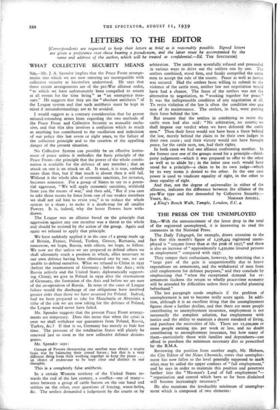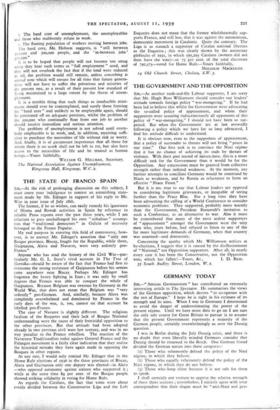THE PRESS ON THE UNEMPLOYED
Srn,—With the announcement of the latest drop in the total of the registered unemployed, it is interesting to read the comments in the National Press.
The Daily Telegraph, for example, draws attention to the fact that this month's figure of 1,256,424 registered unem- ployed is "102,000 fewer than at the peak of 1937," and there is also an increase of "approximately 1,450,000 insured persons m employment" compared with 1937.
They temper their enthusiasm, however, by admitting that a "large part of the gain is unquestionably due to heavy expenditure on armaments, and the withdrawal of men from civil employment for defence purposes," and they conclude by emphasising that "when the exceptional demand for re- armament slackens the return to wholly peace-time economy will be attended by difficulties unless there is careful planning beforehand."
The last paragraph needs emphasis if the problem of unemployment is not to become really acute again. In addi- tion, although it is an excellent thing that the unemployment figures show a further decline, and that there are more people contributing to unemployment insurance, employment is not necessarily the complete solution, but employment with justice and the ability to maintain a decent standard of living, and purchase the necessities of life. There are 11,500,000 or more people earning 5os. per week or less, and no doubt contributing to unemployment insurance, but how many of them—particularly those with families and dependants—can afford to purchase the minimum necessary diet as prescribed by the B.M.A.
Reviewing the position from another angle, Mr. Hobson, the City Editor of the News Chronicle, states that unemploy- ment has now fallen to the level generally supposed to mark what. may be called the upper confines of "full employment," and he says in order to maintain this position and penetrate further into the "No-man's Land of full employment "— " organisation and control which have so far been disdained will become increasingly necessary."
He also mentions the irreducible minimum of unemploy- ment which is composed of two elements: The hard core of unemployment, the unemployables and those who stubbornly refuse to work.
-. The floating population of workers moving between jobs.
The hard core, Mr. Hobson suggests, is "still between 20,000 and 300,000 people, and the in-between jobs' 5co,ocoo." It is to be hoped that people will not become too smug when they hear such terms as "full employment" used, and they will not overlook the fact that if the total were reduced to nil, the problem would still remain, unless something is started now which will ensure for all time that future genera- tions will not have to suffer the privations and miseries of the present one, as a result of their present low standard of hying maintained to a large extent by the threat of unem- ployment. It is a terrible thing that such things as irreducible mini- mums should ever be contemplated, and surely those forming the "hard core" and unlikely to be employable again, should be pensioned off on adequate pensions, whilst the problem of the 500,000 who continually float from one job to another should receive immediate and serious attention.
The problem of unemployment is not solved until every- body employable is in work, and, in addition, receiving suffi- cient to purchase the necessities of life without risk or worry. And, finally, it is of paramount importance that all those for whom there is no work shall not be left to rot, but also have access to the necessities of life and be treated as human beings.—Yours faithfully,
Kingsway Hall, Kin gsway, W.C. 2.









































 Previous page
Previous page